News
View the latest inspiring and positive news and information about what's going on in the PM and IT world.
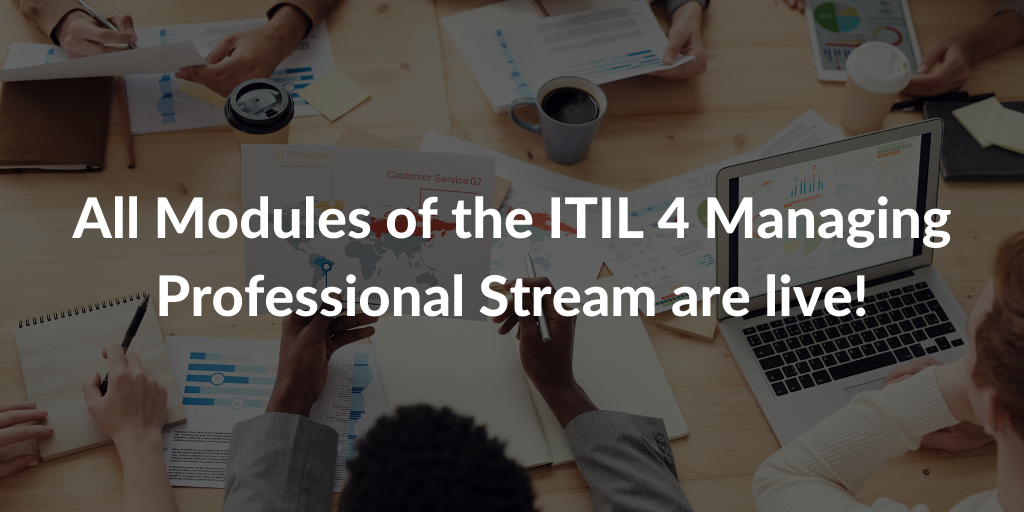
Date: 28/02/2020
AXELOS has just launched the last two modules of ITIL 4 Managing Professional Stream: ITIL 4 Specialist: High Velocity IT (HVIT) and ITIL 4 Specialist: Drive Stakeholder Value (DSV).
With the publication of these last two modules, the ITIL 4 Managing Professional Stream is now completely open to the public!
ITIL Managing Professional targets IT practitioners working within technology and digital teams across businesses. The Managing Professional (MP) stream provides practical and technical knowledge about how to run successful IT projects, teams and workflows.

 With digital products and services, value is only realized when the users act on decisions that have been improved by the information they have derived from the digital products.
The latest iteration of ITIL responds to the fast pace of technological change that organizations are now experiencing. It allows practitioners to progress their existing expertise in ITIL and capitalise on the opportunities that are arising from technological advances. Furthermore, ITIL 4 supports practitioners in carrying out best practice with these services and gives them the tools to take part in this global digital transformation.
Would you like to know more about the other two modules of ITIL 4 Managing Professional Stream?
Here you find the pages on these topics!
With digital products and services, value is only realized when the users act on decisions that have been improved by the information they have derived from the digital products.
The latest iteration of ITIL responds to the fast pace of technological change that organizations are now experiencing. It allows practitioners to progress their existing expertise in ITIL and capitalise on the opportunities that are arising from technological advances. Furthermore, ITIL 4 supports practitioners in carrying out best practice with these services and gives them the tools to take part in this global digital transformation.
Would you like to know more about the other two modules of ITIL 4 Managing Professional Stream?
Here you find the pages on these topics!
Read more
ITIL 4 Specialist: High Velocity IT (HVIT)
The module ITIL 4 Specialist: High Velocity IT is aimed at practitioners who are now confronted with a world of more digitally-enabled organizations and who want to become more valuable and remain relevant in this new era. The way digital technology contributes to enterprises today requires a different way of thinking, working and a new concept of high-velocity IT. HVIT means professionals should be able to make faster decisions about IT changes. It’s not about speed alone: it’s also about what you need when you need it, which is more dynamic and tailored to the user/customer. Working with complex adaptive systems, practitioners can’t rely on pre-determined processes; rather, it’s about taking small, experimental steps to see what works. This needs both a mindset change and a decision to move away from traditional root cause analysis. The High-velocity IT approach in ITIL 4 is a radical rethink of how to operate in ITSM: it means reconstructing service management – by taking it to bits and putting it back together to improve the ways of working. Looking for a way for making your organization digitally-enabled? ITIL 4 Specialist High Velocity IT training
ITIL 4 Specialist: Drive Stakeholder Value (DSV)
The ITIL 4 Specialist Drive Stakeholder Value module is about the engagement and interaction between service providers and stakeholders and the conversion of demand to value via IT-enabled services. ITIL 4 also encourages the service provider to help the consumer to improve: the “consumer” is encouraged to adopt service management best practices as part of the product development relationship to elevate mutual capabilities and thereby increasing the co-created value. As ITIL now includes consumers and producers together in multi-dependent workflows and systems, this module is focused on helping practitioners increase stakeholder satisfaction via the best service offerings; something that is essential to business success in today’s highly competitive landscape. ITIL 4 Drive Stakeholder Value takes a higher-level view of what needs to happen across all four dimensions of service management to create and manage effective and streamlined services. Interested in maximizing the consumer experience? Find out more now about QRP's ITIL 4 specialist Drive Stakeholder Value (DSV) With digital products and services, value is only realized when the users act on decisions that have been improved by the information they have derived from the digital products.
The latest iteration of ITIL responds to the fast pace of technological change that organizations are now experiencing. It allows practitioners to progress their existing expertise in ITIL and capitalise on the opportunities that are arising from technological advances. Furthermore, ITIL 4 supports practitioners in carrying out best practice with these services and gives them the tools to take part in this global digital transformation.
Would you like to know more about the other two modules of ITIL 4 Managing Professional Stream?
Here you find the pages on these topics!
With digital products and services, value is only realized when the users act on decisions that have been improved by the information they have derived from the digital products.
The latest iteration of ITIL responds to the fast pace of technological change that organizations are now experiencing. It allows practitioners to progress their existing expertise in ITIL and capitalise on the opportunities that are arising from technological advances. Furthermore, ITIL 4 supports practitioners in carrying out best practice with these services and gives them the tools to take part in this global digital transformation.
Would you like to know more about the other two modules of ITIL 4 Managing Professional Stream?
Here you find the pages on these topics!

Date: 27/02/2020
The HERMES Foundation certification is a professional qualification in the field of project management.
This certification attests to the understanding of the HERMES 5 project management method.
There are no mandatory requirements. Work experience in project management is recommended.

Read more
HERMES Foundation Examination Target
- Project Manager
- Project Staff
- Controller
- Decision-makers
- PMO staff
- Quality Management
HERMES 5 Foundation Exam Format
- Language: German and French
- Duration: 60 minutes
- Materials permitted: Closed book examination. Books or notes are not allowed
- Number of exam questions: 40
- Pass Mark: to pass the written exam, at least 60% of the maximum achievable points are required (24 correct answers)
- Level of Thinking: Bloom’s levels: 1, 2 & 3
- Examination format: Paper
HERMES Foundation Exam Sample Questions
In the written examinations, questions are asked about the learning objectives underlying the relevant subject areas of the examination. The procedure for the HERMES 5 Foundation exam is the Single-choice questions. Single-choice questions: there are several possible answers to each question. Only one answer can be correct (single choice), so only one answer has to be marked. The evaluation is based on a point system.- Every correct answer gives a plus point,
- any incorrect or missing answer (unchecked cross) will be given a zero score.
Example 'Single-Choice-Frage':
Which is a source of best practice? a) Q b) P c) R d) SHERMES 5 Foundation-Sample question
The HERMES project management method consists of the following method elements: a) Scenarios, modules, tasks, phases and milestones, application notes, roles, results. b) Control, guidance, execution. c) Initialization, concept, realization, introduction. d) IT standard application, IT individual application, service product, organizational adaptation, individual scenario.HERMES 5 Foundation Objectives
Based on the "Service - Product" scenario, the participants have gained a deeper understanding of the interaction of the various elements of HERMES, know how to create individual scenarios and are ready for efficient collaboration in HERMES projects. Here is the list of the main learning objectives:- The participants have understood the HERMES basics.
- The participants have gained an overview of the scope and structure of the standard scenario "
- Service/Product".
- The participants have gained an in-depth insight into the modules "Project control, project management, project basics, product, business organization and implementation organization" in the context of the standard scenario "Service/Product".
- The participants have dealt in depth with questions of project organization (roles) in the "Service/Product" scenario.
- The participants know how to create individual scenarios.
- The participants are prepared for the HERMES Foundation certification exam (not relevant for the exam).
HERMES 5 Foundation Certification
The participant receives a certificate for the passed exam. If the participant does not pass, he or she receives a certificate of results for taking the exam The HERMES 5 Foundation certificate is valid for life; this certificate will never expire.

Date: 26/02/2020
A Business Case describes the reasoning behind starting a project or activity.
It is often presented in the form of a well-structured written document, but sometimes it can take the form of a presentation or a simple verbal agreement. The logic of the business case is that whenever economic, tangible or intangible resources are consumed, this should be in support of a specific business need.

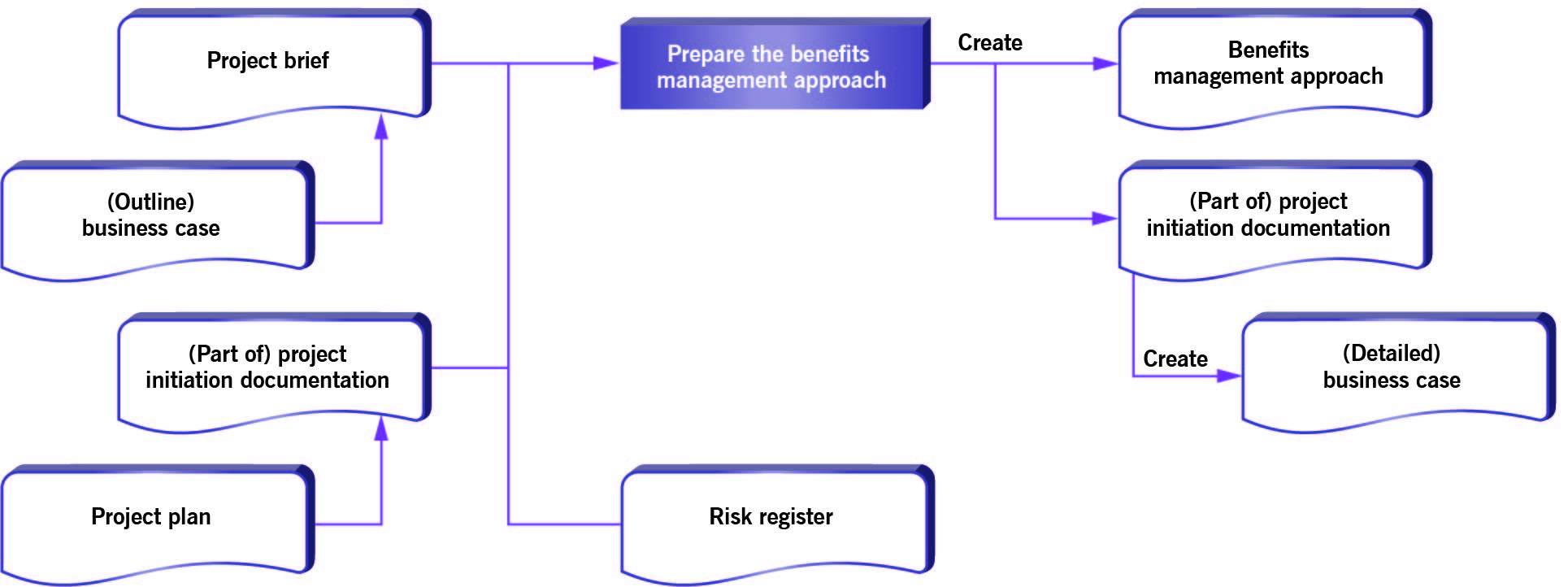
Read more
What is a Business Case?
A Business Case represents the justification of a project and includes timescales, costs, benefits and risks. The continuing viability of a project is tested against the Business Case. It offers useful information that helps to determine whether a project is (and continues to be) desirable, feasible and achievable.What is Business Case in Project Management?
Often during the course of a project, the focus is on what is being done and how losing sight of the ‘why’. Business Case is an essential element because it defines why it is worthwhile to continue the project. The Business Case is used to document the justification for the execution of a project based on the estimated costs and benefits, taking in consideration the possible related risks. Within the PRINCE2 approach the Business Case is seen as a test for the viability of the project; answering the question ‘is the investment still valid?” The Business Case is not static: it is maintained for the complete course of the project and constantly adjusted for new information on costs, risks and benefits. Within the PRINCE2 approach, the Business Case is usually developed at the beginning of a project and maintained for the complete lifecycle of the project. The Business Case is subjected to formal verification by the Project Committee at each key decision-making moment and confirmed during the period in which the benefits are confirmed.
Composition of the Business Case
The Business Case has to describe the motive to undertake the project. It has to contain the following elements:- Executive summary: highlights the key-points of the Business case and must include the benefits and the ROI (return of investment).
- Reason: elaborates the reasons why it is necessary to undertake the project and how the business strategies and objectives are included.
- Business options: analysis of the possible options; no initiative, minimum action or take action.
- Expected benefits: the benefits that will be delivered by the project, expressed in measurable terms. Both qualitative and quantitative benefits are mentioned, in line with the defined business benefits. It is important to establish the current state of the benefit in measurable terms in order to be able to evaluate progress after completion of the project. Measurable benefits are also used to establish the methods and moments for measuring improvements.
- Expected dis-benefits: The measurable decline resulting from an outcome perceived as negative by one or more stakeholders. Dis-benefits are consequential effects that reduce one or more organizational objective. Dis-benefits have to be assessed and incorporated in the investment assessment. The difference between dis-benefit and risk is that the latter has a level of uncertainty, the dis-benefit has not.
- Timescale: Execution times of the project in which the benefits should be realized.
- Costs: Summary of the costs, including the current operating costs and the maintenance costs of the project in respect to the financial plan.
- Evaluation of the investment: compares benefits and dis-benefits with the costs of the project and the ongoing costs of operation and maintenance.
- Main risks: assessment and summary of all main risks related to the project, their probable impact and action to undertake when the risks materialize.

Where can I find more data/sources to elaborate on the Business Case?
The executive is the one accountable for the Business Case. This does not mean that he/she is the one that actually writes it; however, he/she is responsible for the creation and the approval. Within the PRINCE2 the Business Case primarily derives from the project mandate and is developed in the pre-planning phase to obtain the approval of the Project Committee. The final Business Case takes it to shape by the information from the project plan and risk assessment. The Business Case contains elements of:- Project Mandate and Project Brief - the project’s motives.
- Project plan - costs and planning.
- Expected benefits - in line with business benefits.
- Economic analysis - elaborated information of the economic environment.
- Risk register - information related to identified risk, including their status and history.
- Issue log - all information related to possible issues.
Format
The Business Case can be delivered in several formats, of which:- The document, spreadsheet or presentation slide.
- File within a project management tool.
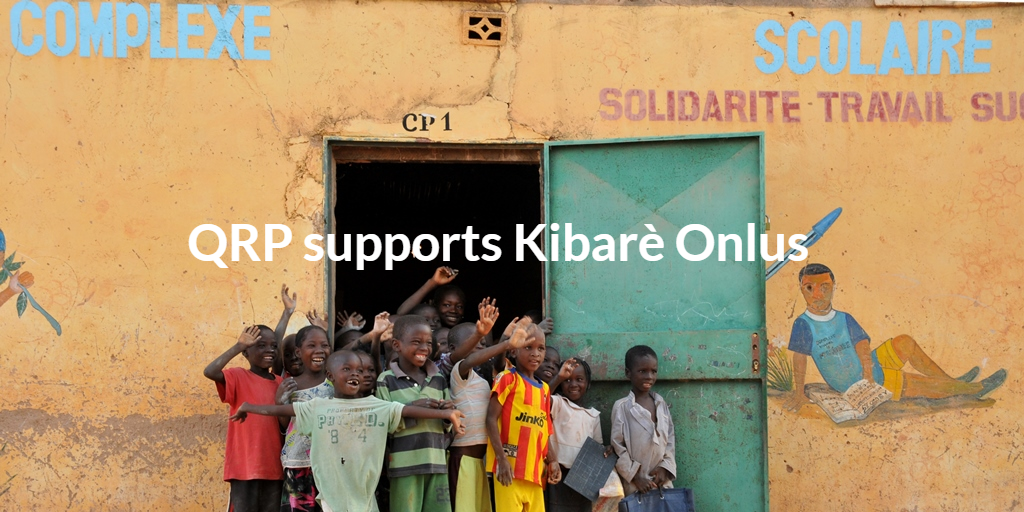
Date: 24/02/2020
QRP International has a core purpose: "Developing professionals to facilitate change". We believe in change as a tool for growth and improvement, not only professionally, but also in our society.
This is the reason why every year we choose to support a cause.
This year we chose to support Kibarè Onlus.
Kibarè was founded in Como in 2013 and its founder members boast 20 years of experience in international cooperation in India and Africa, especially in Burkina Faso.
What are they doing?
We asked a member of Kibarè to introduce their project in Burkina Faso:
Read more
“Going to school is a privilege in Burkina Faso. Many parents think that children should rather help the family to grow crops; some also think that girls should wed and move out when they are barely in their teens. Issa Yelemou has dedicated his life to give these children a chance. In 2006, when he retired from being a teacher, he invested his life's savings to build his own primary school in the outskirts of Ouagadougou, the capital of Burkina Faso. He called the school Millennium and he became its headmaster. His vision attracted talented and motivated teachers, which have made the school a centre of excellence in the area. Over the years though, heavy rain seasons have taken their toll on the school buildings. Water has infiltrated the cheap cement and large cracks have appeared on the walls. Families have started to pull their children from school, fearing for their safety. Since 2016, we have been helping Issa Yelemou to rebuild the school. Some classes have already moved into the safe and dry rooms of a new wing, but many others still hope for the construction project to finish on time for the next school year.”QRP International decided to support the organization with a donation that will enable Issa Yelemou to finish the construction project on time. Because all children need to study in a safe and stable environment to grow and develop their potential. Visit their website to know their mission, stories and beautiful achievements: Kibarè Onlus or follow their account: Instagram, Facebook
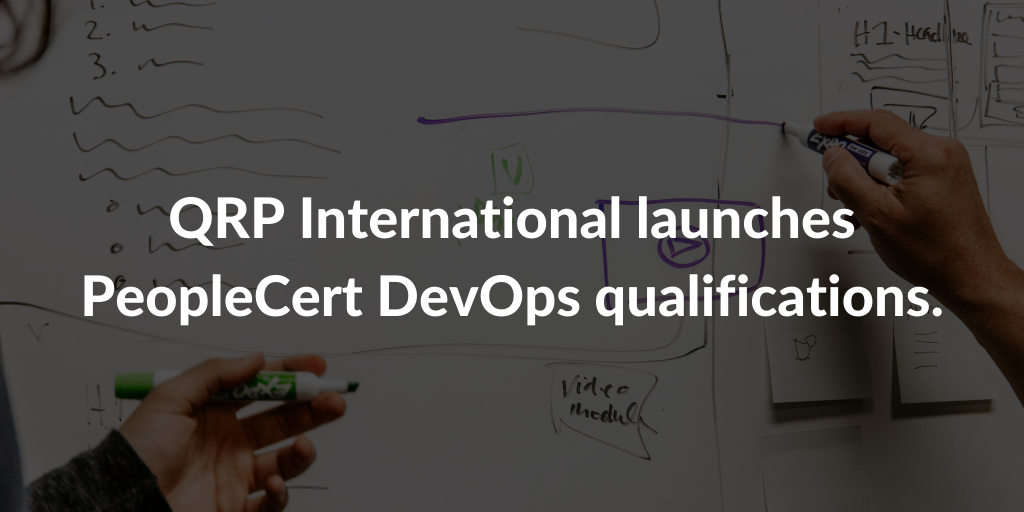
Date: 17/02/2020
QRP International is proud to announce the launch of new PeopleCert DevOps qualifications.

Read more
PeopleCert DevOps
DevOps (a clipped compound of “development” and “operations“) is a software development approach to work that combines software development (Dev) with information technology operations (Ops).
The goal of DevOps is to shorten the systems development life cycle while delivering software releases frequently, in close alignment with business objectives in a faster, better, and cost-efficient way.
DevOps qualifications are offered by PeopleCert: these new hands-on qualifications are designed around those organisations using well-established IT Service Management practices to provide them with guidance on the ideal processes, tools and culture integration with DevOps.
PeopleCert DevOps qualifications levels
The Peoplecert DevOps qualification scheme currently consists of three distinct certifications:
PeopleCert DevOps Fundamentals
Candidates gain practical guidance on how to deliver effective DevOps through 15 essential practices, especially about well-established ITSM frameworks.
PeopleCert DevOps Leadership
Candidates get guidance on how to lead the implementation of DevOps practices and how to achieve a cultural shift for better collaboration and communication.
PeopleCert DevOps Engineering
Candidates will gain practical guidance on automation tools use and how these tools support DevOps culture and practices. – Coming soon
Feel free to get in touch to have more info on the PeopleCert DevOps.
Date: 12/02/2020
In 2019, we saw numerous examples of successful DevOps initiatives across large and small enterprises – congratulations to all of you who were involved in one.
But what can we expect for the future of DevOps 2020?
As thought leaders in the DevOps community, we believe the following ten trends will shape the next year of DevOps across the globe.
1) Agile and DevOps will increase collaboration between technology and business functions
2) Training, learning, and improving DevOps skills will become an organizational priority
3) Upskilling and cross-skilling will lead to the rise of the T-shaped professional
4) More teams will shift mindsets from a “job done” to “value realized”
5) Tool fatigue will worsen before it gets better
6) DevOps will become more measurable and metrics will become better defined
7) DevOps teams will earn more and experience increased job satisfaction
8) There just might be Service Management and DevOps reunification
9) A new generation of IT members are taking over
10) Artificial Intelligence adoption will rise, and DevOps teams should check it out.
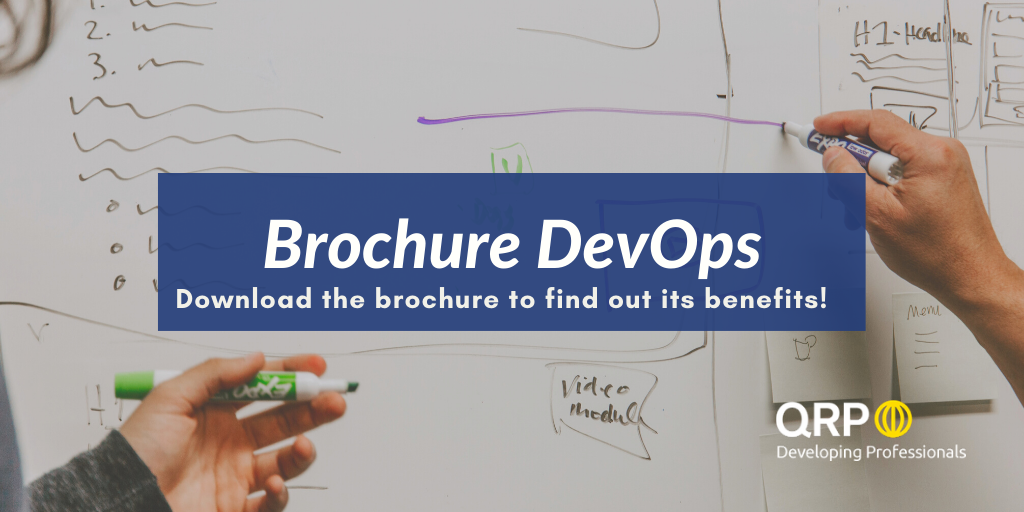 Originally published on The Enterprisers Project and reproduced with kind permission of “DevOps institute”. Translation: © 2019 DevOps Institute. All Rights Reserved. Translated by QRP International, on behalf of Devops Institute in January 2020
Originally published on The Enterprisers Project and reproduced with kind permission of “DevOps institute”. Translation: © 2019 DevOps Institute. All Rights Reserved. Translated by QRP International, on behalf of Devops Institute in January 2020
Read more
1) Agile and DevOps will increase collaboration between technology and business functions
Agile and DevOps are grassroots movements that started within technology. In many cases, however, Agile and DevOps have not been able to break out of technology. On the other hand, Agile has been adopted in other functions including finance, human resources and procurement, and marketing. Some senior leaders are increasingly inviting their whole organizations to “become agile.” However, this doesn’t seem to have helped the technology community join forces with their colleagues in these other functions. Because of the competitive pressure digital is putting on organizations, we will start to see more collaboration across functions with agile as the conversation starter. To speed this up, encourage your teams to talk to people from different functions about their experience using agile methods. Questions that can help break the ice include:- How are you doing agile?
- What are you doing?
- What is changing for you?
- What issues are you having?
- How could we work together to help to address some of these issues?
2) Training, learning, and improving DevOps skills will become an organizational priority
DevOps requires trying out new technologies. Recent research from the DevOps Institute found that 55 percent of survey respondents prefer to hire into their DevOps teams from within their organization. Unfortunately, many companies don’t have the necessary skills to do this and hiring new people might not be possible due to budget restraints. One approach is to create internal training universities. This is what the courier delivery services firm FedEx did. The company knew it did not have adequate skills in its talent pool of engineers, leading their CIO to initiate the FedEx Cloud Dojo, which teaches its own engineers modern software development and technologies and functions as a university for FedEx. The university has reskilled more than 2,5000 software programmers. Organizations that want to use DevOps to help advance their digital transformations must make drastic improvements in training, learning, and improving skills that are essential to DevOps. We expect to see the more proactive pursuit of this in 2020.3) Upskilling and cross-skilling will lead to the rise of the T-shaped professional
Recognizing the strained talent market, organizations and individuals will invest heavily in upskilling and cross-skilling in order to meet accelerating demands for new skills. While all IT professionals will need to become more cross-domain competent, developers, in particular, will have to add new breadth to their skills portfolio in areas such as testing, containerization, infrastructure, AI, and security. There will also be a stronger emphasis on core (soft) skills such as empathy, customer experience, and collaboration. Silos are starting to come down in many areas, and the need for everyone to become T-shaped, with depth and breadth of knowledge will become necessary to enable and support innovation. All of this training and new collaboration (see No. 1 above) will lead to more workers developing new technical and professional skills and personal qualities, adding new depth and capabilities to the individuals on your teams.4) More teams will shift mindsets from a “job done” to “value realized”
Value Stream Mapping can help change the way your teams think about the definition of done (DoD) from being “I did my job” to “the value is realized.” It is one of the most effective ways of changing behaviours and getting your teams to think about the end-to-end lifecycle of what they’re working on. This is why the adoption of Value Stream Management is critical in 2020. It will enable you to automate the outputs from Value Stream Mapping for ongoing progress monitoring. This lets a team connect all parts of the ever-complex DevOps toolchains with system-derived data based on cycle time. Teams that adopt Value Stream Management in 2020 will be able to base their next improvement experiments on data-driven decisions and prioritizations.5) Tool fatigue will worsen before it gets better
The number of tools and frameworks in technology are daunting. The challenges IT teams face to understand, interconnect, and apply much of these will continue, and in 2020, there is no real resolution in sight. The competition in the DevOps toolchain is fierce and flourishing. Events and conferences are filled with technology and best practice sessions. Books, blogs, and videos are flooding email inboxes, with thought leaders are eager to share their expertise. Additionally, more open-source tools are emerging to integrate new technologies. To survive the challenges of complexity, it’s becoming increasingly important to have an automation strategy. As you work to develop this, don’t lose sight of the actual problems you are trying to solve and how you can get there by leveraging your own teams.6) DevOps will become more measurable and metrics will become better defined
“What gets measured gets managed.” This quote is still valid, more than 60 years after Peter Druker referenced it in his book, “The practice of management.” What we all want to avoid, however, is the syndrome of measuring for metric's sake. For the next few years of DevOps, the continuous improvement metrics we know today will continue to be the key metrics that matter. In 2020, we expect more organizations will agree on what to measure and adopt these metrics. Those looking for support can lean on the performance metrics outlined in research from DevOps Research and Assessment (DORA), which cites five measures of Software Delivery and Operational Performance (SDO) that can be used as leading indicators of success for high-performing DevOps teams. Key benchmarks within the report provide guidance on areas teams must improve in 2020. Selecting these key metrics and populating them with data will provide insights into the value and journey of DevOps.7) DevOps teams will earn more and experience increased job satisfaction
For employees who continue to proceed down the DevOps path in 2020, there will be benefits which will go directly towards their wallet and job satisfaction. Automation will allow employees to work on more value-adding work instead of mundane manual tasks, resulting in improved job satisfaction and hopefully reduced stress levels. In particular, DevOps engineers that see their work in automating and collaborating for improved software delivery can expect their salary to be significantly higher than peers in traditional roles, such as system administrators. Investments in training and certifications will also positively reflect on the quality of code and therefore may improve the business results. This, in turn, might finally change the value equation within organizations and give IT a true strategic seat at the table. It will certainly improve how other functional areas work with IT now and in the future.8) There just might be Service Management and DevOps reunification
With the recent release of ITILv4, 2020 will be an interesting year for organizations that have been adopting DevOps and service management frameworks. The development and management of software products need agile techniques, with a focus on value co-creation in a way that reduces waste. DevOps, service management, and other best practices like SRE can coexist to align teams, meet stakeholder demands, and improve the value delivered. Because digital transformation is not achieved instantly across an organization, established companies should begin with best practices and methodologies that are suited to their needs by starting small – then learn, build expertise, and scale-up.9) A new generation of IT members are taking over
The number of people who remember the days before DevOps is starting to shrink. The younger generation on today’s IT and DevOps teams don’t remember the strict silos, where there were clear lines around areas of responsibility such as infrastructure, operations, application design, development, testing and security. They don’t remember how this caused a lot of transition work between teams and groups. They don’t know that product owners, business analysts, architects, developers, testers, release managers, system administrators and infrastructure owners had to agree and coordinate on the planning, development, testing, deploying, operating and management of a piece of software. Just typing that sentence was exhausting, imagine living it. When we celebrated the 10-year anniversary of DevOps in 2019, we saw the wall removed between Dev and Ops. This is a reason for all of us to celebrate.10) Artificial Intelligence adoption will rise, and DevOps teams should check it out.
AI and machine learning (ML) were recently rated as the most important enterprise technology of the next decade, according to a recent report from ISACA. Both will play a critical role in next-generation IT operations and DevOps teams. AIOps will give DevOps teams the ability to analyze more data faster, allowing them to improve key processes, tasks, and decision making. In 2020, expect to see more DevOps teams adopting these tools, which automate the ingestion of fast volumes of data, use ML to analyze the data, and have the ability to leverage knowledge for automation or decision making. The AIOps market has already gained momentum, with 22 percent of IT enterprises using ML and data sciences as part of their work. The vendor landscape is broad with a variety of leaders. This year, the AIOps market will continue its shift from a science project to the pilot and experimental stage. A lot of work remains in 2020 to aid in the future of DevOps adoption. It will require more than focusing on tools and techniques. DevOps initiatives must be registered as change programs, requiring a time, resource, and priority commitment from all business leaders. We’re hopeful that some of these trends will be realized this year, and that DevOps will be recognized as a new way of working. Originally published on The Enterprisers Project and reproduced with kind permission of “DevOps institute”. Translation: © 2019 DevOps Institute. All Rights Reserved. Translated by QRP International, on behalf of Devops Institute in January 2020
Originally published on The Enterprisers Project and reproduced with kind permission of “DevOps institute”. Translation: © 2019 DevOps Institute. All Rights Reserved. Translated by QRP International, on behalf of Devops Institute in January 2020






